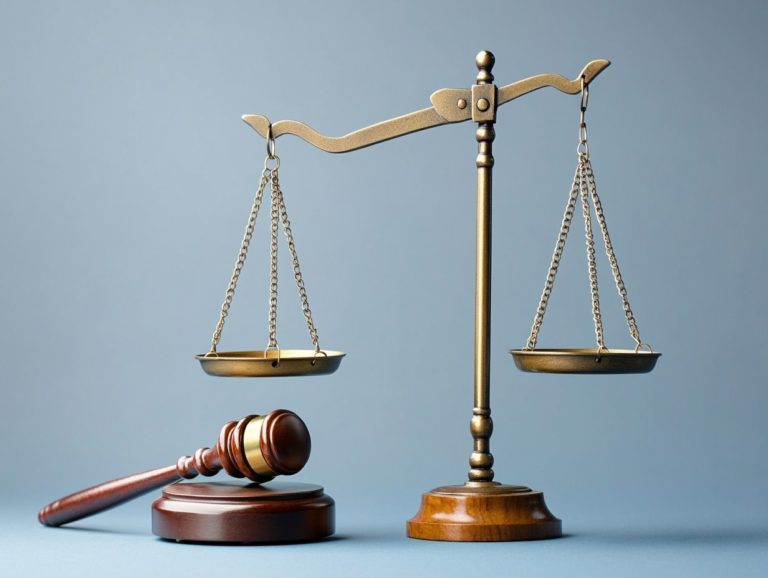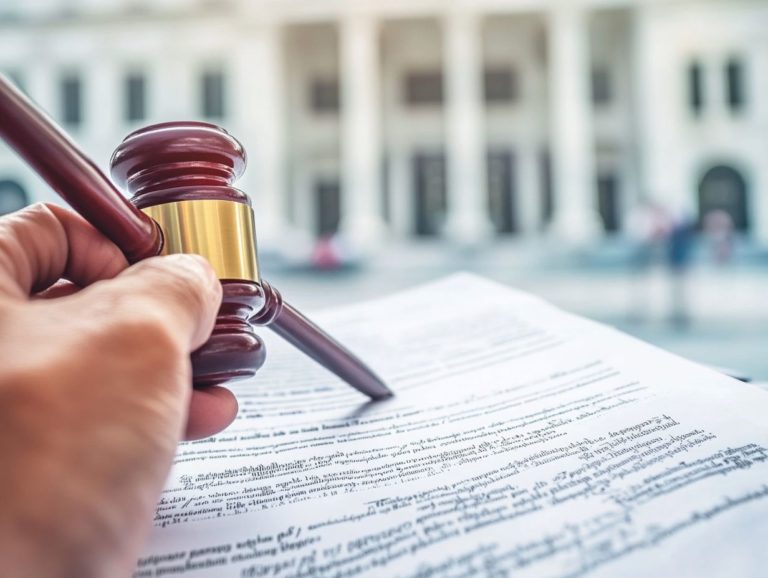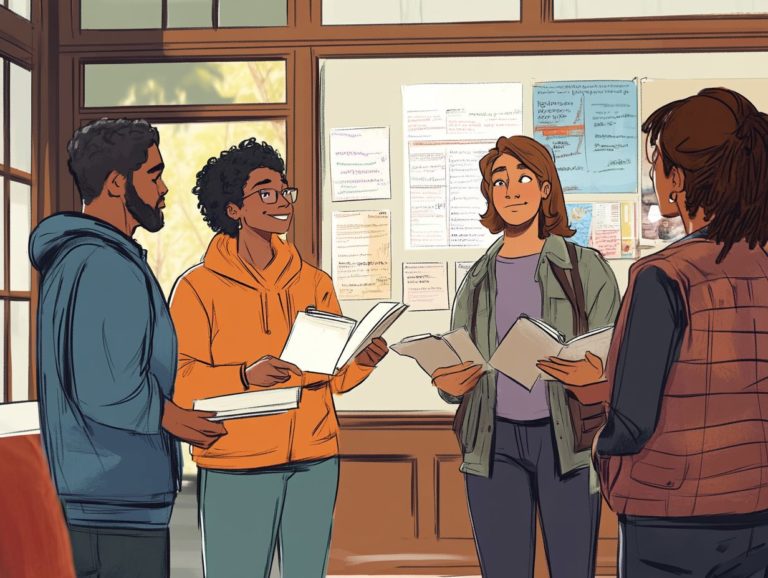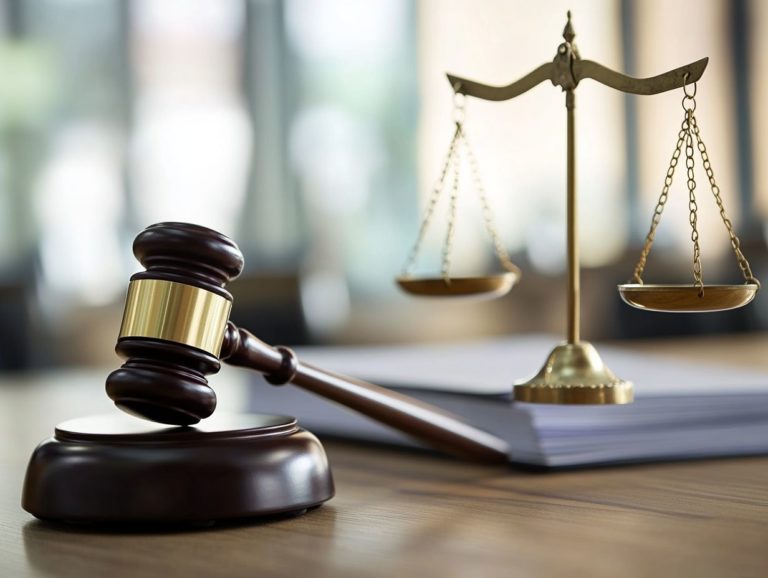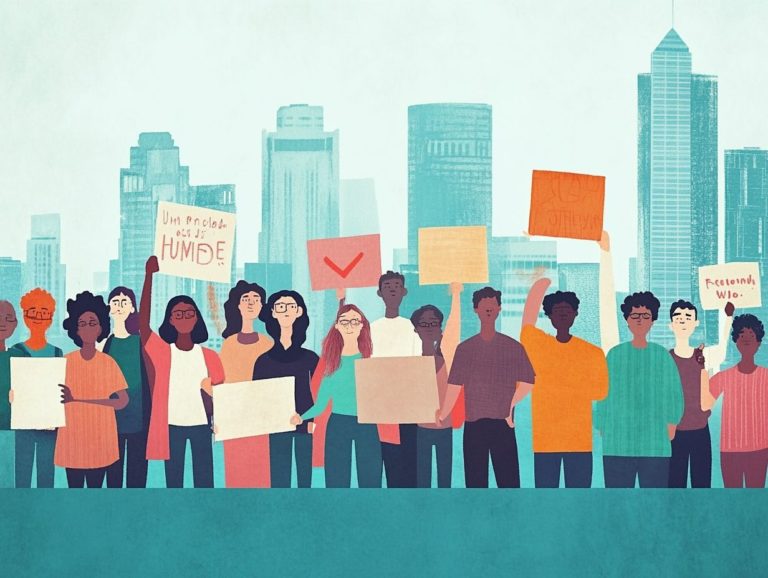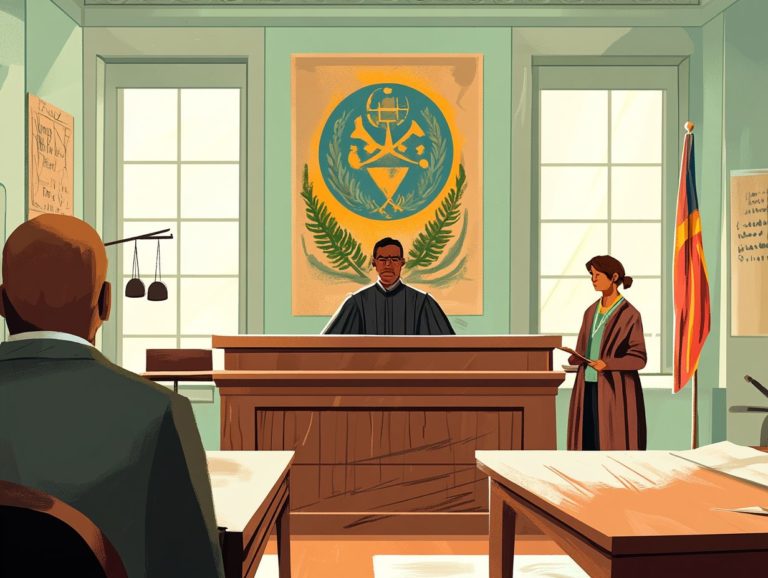Legal Support Resources for the Accused
Navigating the legal system can feel overwhelming, especially for those facing charges. Understanding the various legal support resources available can empower you to make informed decisions about your representation.
From public defenders to pro bono services and legal aid organizations, many options exist to assist those in need. This article explores each type of legal support, outlining eligibility criteria, benefits, and additional resources that can guide you through the details of the law.
Contents
- Key Takeaways:
- Understanding Legal Support Resources
- Public Defender Services
- Pro Bono Legal Services
- Legal Aid Organizations
- Private Legal Representation
- Navigating the Legal System
- Additional Support Resources
- Frequently Asked Questions
- What are some examples of legal support resources for the accused?
- What is the role of a public defender?
- Who can qualify for legal aid resources?
- Are there any free legal support resources for the accused?
- What should I do if I cannot afford a private attorney?
- Can I change my court-appointed attorney if I am not satisfied with their services?
Key Takeaways:
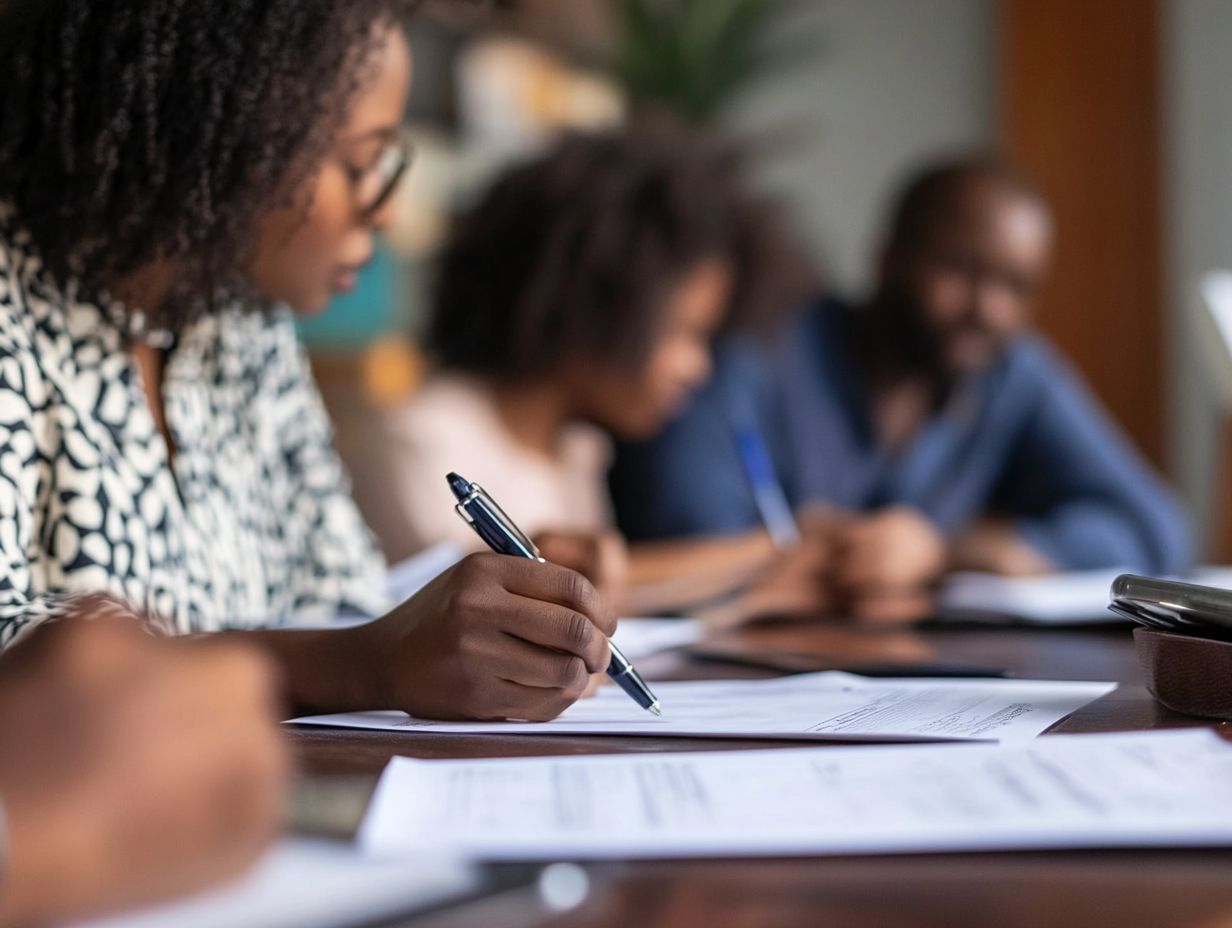
- Public defender services are available for those with financial need and provide legal representation and advice.
- Pro bono services offer free legal assistance for individuals unable to pay for a private attorney.
- Legal aid organizations help low-income individuals with legal advice and representation.
Understanding Legal Support Resources
Understanding legal support resources is crucial for anyone facing various legal challenges, such as domestic violence, eviction, child custody disputes, or employment law issues.
These resources offer a wide array of services, including affordable legal aid, pro bono programs, and legal advice from cost-effective attorneys.
They aim to empower low-income individuals and marginalized communities, helping them understand the details of the court system and ensuring that access to justice and legal representation is available to all.
Types of Legal Support Available
You have access to various legal support options tailored to meet your specific needs, including legal aid organizations, pro bono attorneys, and community legal clinics. Each resource addresses particular legal issues faced by individuals, especially those from low-income backgrounds.
These services cover a broad range of areas, such as family law, housing disputes, and immigration matters. Legal aid organizations often provide extensive assistance to those who qualify based on their income, ensuring that vulnerable populations receive the legal representation they deserve.
Pro bono services enable attorneys to volunteer their expertise at no cost, extending a helping hand to those who may not afford legal assistance otherwise. Community legal clinics focus on client education, offering insights into rights and delivering initial legal advice to help navigate the complexities of the legal system.
Every type of legal support plays a vital role in improving access to justice and enabling marginalized communities, ensuring that everyone has an opportunity to tackle their legal challenges fairly.
Public Defender Services
Public defender services are essential within the legal system, offering crucial legal representation to individuals unable to afford private counsel. This commitment helps preserve the right to a fair trial for low-income defendants navigating the complexities of the court system.
Eligibility and Benefits
Eligibility for public defender services usually depends on your income level. Many jurisdictions require proof of financial need to qualify for free legal representation, which is funded by legal services corporations and local government resources.
To demonstrate this eligibility, you often need to provide documents like pay stubs, tax returns, or bank statements that clearly reflect your financial situation. Each jurisdiction has its own specific income thresholds, but the primary goal is to assist those who cannot afford private counsel.
Having legal representation is crucial, especially in criminal cases. It helps you navigate the legal system effectively. Legal assistance not only supports you during the trial but also plays a vital role in negotiating plea deals, ultimately boosting your chances of a favorable outcome.
Pro Bono Legal Services

Struggling to afford legal help? Pro bono services are here to support you! Pro bono legal services play a vital role for individuals who find themselves unable to afford legal representation. These services offer invaluable free legal assistance through nonprofit organizations and dedicated volunteer lawyers who are genuinely committed to supporting community members in need.
What They Offer and How to Access Them
Pro bono legal services provide an array of assistance tailored just for you, including legal advice, representation for civil matters, and access to self-help resources that enable you to navigate your legal questions and issues with confidence.
If you’re in need, you can tap into these valuable resources on different online legal platforms that offer free consultations and tailored guides for your specific situation.
Many organizations provide legal forms and templates. These simplify the preparation process and help you understand what is needed for your legal proceedings.
Community resources play a crucial role as well, connecting you with victim assistance programs designed to support individuals facing legal challenges. This creates a pathway for you to secure knowledgeable guidance and support throughout the entire process.
Legal Aid Organizations
Legal aid organizations stand as essential resources for low-income individuals, offering a diverse array of legal services. They provide assistance with family law matters, eviction issues, and access to public benefits. Often, these services come at no cost or are available on a sliding scale based on income, ensuring that legal support reaches those who need it most.
Services Provided and How to Qualify
The services offered by legal aid organizations typically encompass legal representation, consultations, and assistance with paperwork. To qualify for these services, your income must generally fall below a certain level. This ensures that support reaches those who need it most.
These organizations often focus on critical areas such as family law, guiding individuals through complex issues like divorce, custody disputes, and child support modifications. They play a crucial role in eviction prevention, providing essential support to tenants facing housing instability.
Community partnerships enhance awareness, highlighting the fundamental importance of legal representation to safeguard your rights. Ultimately, this collective approach paves the way for a more just society.
Private Legal Representation
Private legal representation is a viable option for individuals who have the means to engage a cost-effective attorney for a range of legal challenges. It offers you personalized legal advice and representation, enabling you to navigate complex legal matters with confidence and precision.
Costs and How to Find a Lawyer
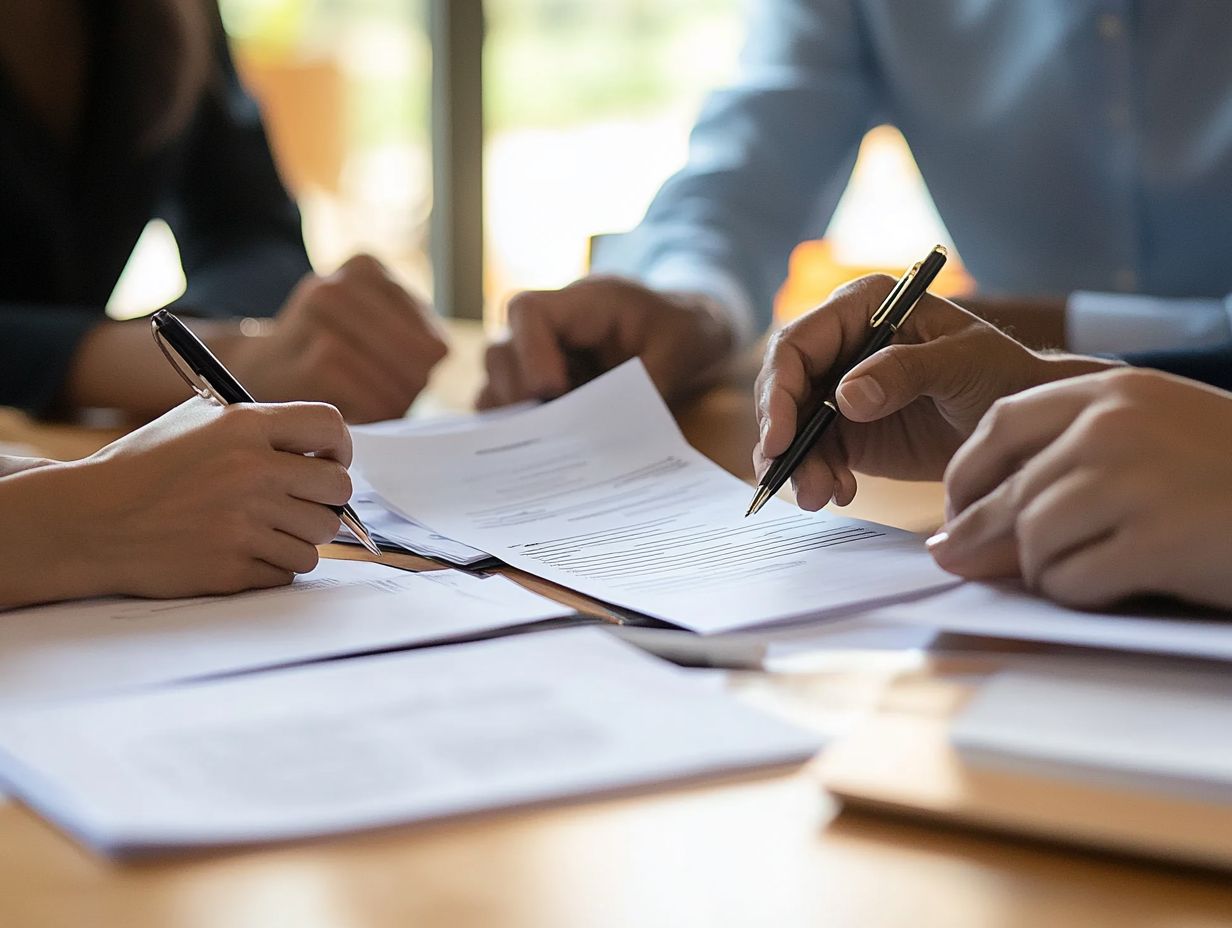
The costs of hiring a private lawyer can vary significantly, so it s crucial for you to understand how to find a lawyer who fits both your budget and legal requirements, including options for affordable legal services.
Private legal representation can come with fees that range from hourly rates to flat fees, depending on the complexity of your case and the lawyer’s experience. Many people seek funding allocations that prioritize affordable legal assistance, as navigating the legal system can be financially daunting.
To assist in your search, you can explore resources like legal aid organizations, which offer support based on income, as well as reputable online legal platforms that connect you with suitable attorneys. By utilizing these resources, you can make informed decisions and find representation that not only addresses your legal needs but also aligns with your financial situation. Don t wait explore your options today!
Navigating the legal system can feel overwhelming, but grasping your legal rights and court procedures is essential for tackling your legal issues effectively and securing the justice you deserve.
Understanding Court Procedures and Rights
Understanding court procedures and legal rights is crucial for anyone involved in legal matters. It enables you to advocate for yourself and seek the necessary legal assistance when needed.
By familiarizing yourself with the process of filing documents such as petitions (formal requests to the court) and motions (requests for a court order) you can navigate the system with greater ease and confidence.
This knowledge also extends to attending hearings. The clarity with which you present your case can profoundly influence the outcome.
Recognizing your legal rights allows you to make informed decisions and understand the potential consequences of your actions. Accessing legal resources like community legal clinics or online databases can provide invaluable support and guidance.
All these elements highlight the importance of being proactive and well-prepared when confronting court-related challenges.
Additional Support Resources
Beyond legal aid and representation, it’s crucial to access additional support resources like counseling services, victim assistance programs, and community legal clinics.
These resources play a vital role in addressing the diverse legal challenges you may encounter, such as domestic violence and housing instability.
Counseling and Other Services for the Accused
Counseling and other services for the accused are essential in providing support to individuals facing legal charges. They offer not just emotional reassurance but also vital guidance on legal representation and navigating the complexities of the legal system.
These services encompass a range of options tailored to your needs, including:
- Individual therapy
- Group counseling
- Specialized programs focused on stress management and coping strategies
Such support not only helps you process your feelings but also enhances your understanding of your legal options, enabling you to better address your situation. Victim assistance programs often complement these services, fostering a sense of community support that can be crucial during these tumultuous times.
By giving you the right tools, counseling services can really boost your well-being as you face these challenging circumstances.
Frequently Asked Questions
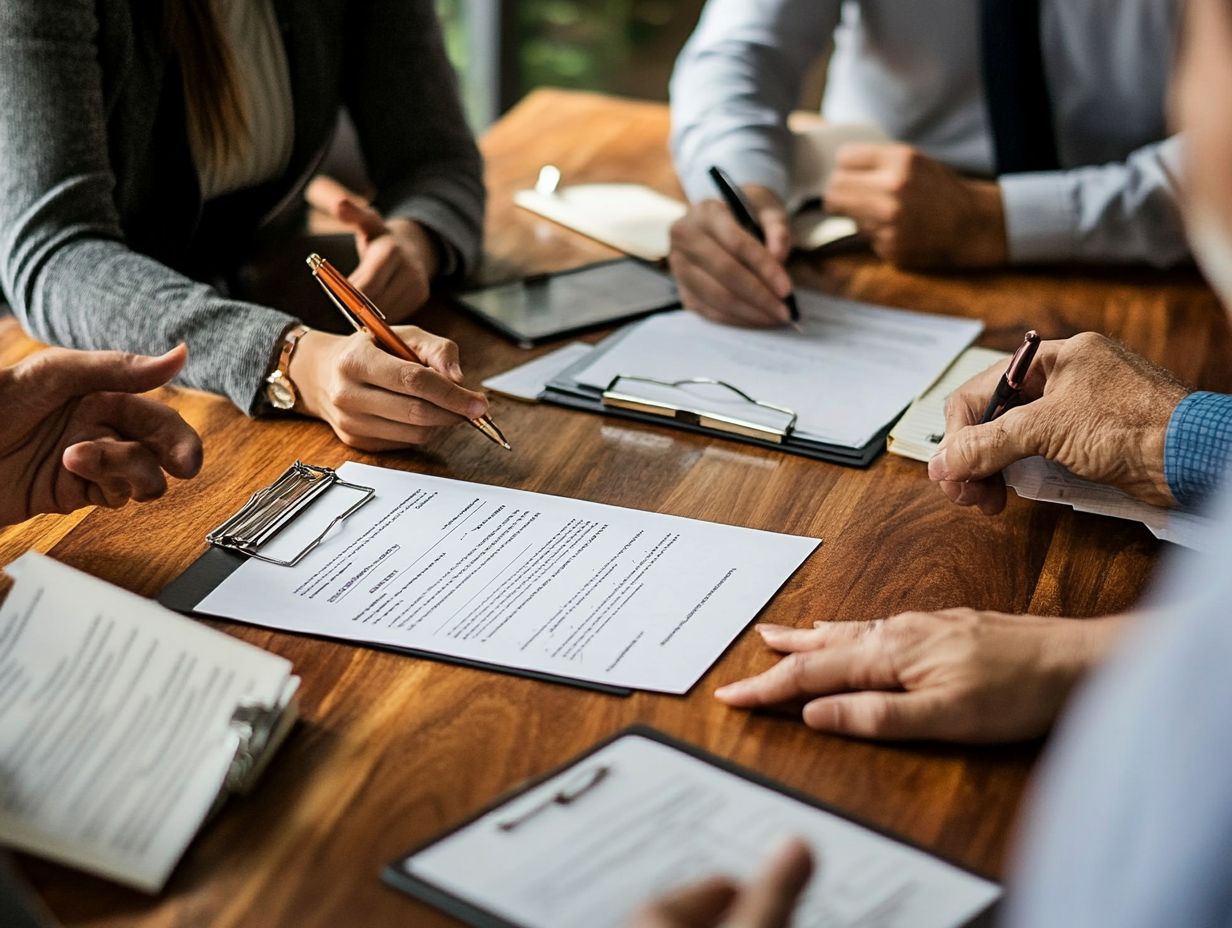
What are some examples of legal support resources for the accused?
Some examples of legal support resources for the accused include public defenders, legal aid organizations, pro bono attorneys, and court-appointed attorneys.
What is the role of a public defender?
A public defender is an attorney appointed by the court to provide legal representation to individuals who cannot afford to hire a private attorney. They typically handle criminal cases and are responsible for protecting the rights of the accused.
Who can qualify for legal aid resources?
Legal aid resources are usually available to low-income individuals who cannot afford to hire a private attorney. Eligibility criteria may vary depending on the specific organization or program.
Are there any free legal support resources for the accused?
Yes, there are several free legal support resources for the accused, such as public defenders, pro bono attorneys, and legal aid organizations. For a deeper understanding of these resources, you can refer to the rights of the accused: a comprehensive guide. These resources are available to individuals who cannot afford to pay for legal representation.
What should I do if I cannot afford a private attorney?
If you cannot afford a private attorney, contact your local legal aid organization or public defender’s office. They can provide you with information on available resources and assist you in obtaining legal representation.
Can I change my court-appointed attorney if I am not satisfied with their services?
It may be possible to change your court-appointed attorney, but this process varies depending on your jurisdiction. Discuss your concerns with your attorney and the court to determine the best course of action.
Don’t wait! Get the help you need today!

